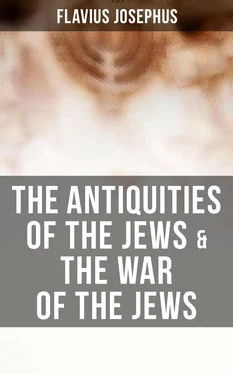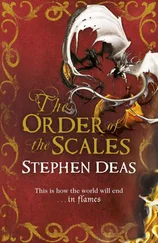4. Now David had a design to send to Absalom, not that he should come to be punished, but that he might be with him, for the effects of his anger were abated by length of time. It was Joab, the captain of his host, that chiefly persuaded him so to do; for he suborned an ordinary woman, that was stricken in age, to go to the king in mourning apparel, who said thus to him: — That two of her sons, in a coarse way, had some difference between them, and that in the progress of that difference they came to an open quarrel, and that one was smitten by the other, and was dead; and she desired him to interpose in this case, and to do her the favor to save this her son from her kindred, who were very zealous to have him that had slain his brother put to death, that so she might not be further deprived of the hopes she had of being taken care of in her old age by him; and that if he would hinder this slaughter of her son by those that wished for it, he would do her a great favor, because the kindred would not be restrained from their purpose by any thing else than by the fear of him. And when the king had given his consent to what the woman had begged of him, she made this reply to him: — "I owe thee thanks for thy benignity to me in pitying my old age, and preventing the loss of my only remaining child; but in order to assure me of this thy kindness, be first reconciled to thine own son, and cease to be angry with him; for how shall I persuade myself that thou hast really bestowed this favor upon me, while thou thyself continuest after the like manner in thy wrath to thine own son? for it is a foolish thing to add willfully another to thy dead son, while the death of the other was brought about without thy consent." And now the king perceived that this pretended story was a subornation derived from Joab, and was of his contrivance; and when, upon inquiry of the old woman, he understood it to be so in reality, he called for Joab, and told him he had obtained what he requested according to his own mind; and he bid him bring Absalom back, for he was not now displeased, but had already ceased to be angry with him. So Joab bowed himself down to the king, and took his words kindly, and went immediately to Geshur, and took Absalom with him, and came to Jerusalem.
5. However, the king sent a message to his son beforehand, as he was coming, and commanded him to retire to his own house, for he was not yet in such a disposition as to think fit at present to see him. Accordingly, upon the father's command, he avoided coming into his presence, and contented himself with the respects paid him by his own family only. Now his beauty was not impaired, either by the grief he had been under, or by the want of such care as was proper to be taken of a king's son, for he still surpassed and excelled all men in the tallness of his body, and was more eminent (in a fine appearance) than those that dieted the most luxuriously; and indeed such was the thickness of the hair of his head, that it was with difficulty that he was polled every eighth day; and his hair weighed two hundred shekels 1which are five pounds. However, he dwelt in Jerusalem two years, and became the father of three sons, and one daughter; which daughter was of very great beauty, and which Rehoboam, the son of Solomon, took to wife afterward, and had by her a son named Abijah. But Absalom sent to Joab, and desired him to pacify his father entirely towards him; and to beseech him to give him leave to come to him to see him, and speak with him. But when Joab neglected so to do, he sent some of his own servants, and set fire to the field adjoining to him; which, when Joab understood, he came to Absalom, and accused him of what he had done; and asked him the reason why he did so. To which Absalom replied, that "I have found out this stratagem that might bring thee to us, while thou hast taken no care to perform the injunction I laid upon thee, which was this, to reconcile my father to me; and I really beg it of thee, now thou art here, to pacify my father as to me, since I esteem my coming hither to be more grievous than my banishment, while my father's wrath against me continues." Hereby Joab was persuaded, and pitied the distress that Absalom was in, and became an intercessor with the king for him. And when he had discoursed with his father, he soon brought him to that amicable disposition towards Absalom, that he presently sent for him to come to him; and when he had cast himself down upon the ground, and had begged for the forgiveness of his offenses, the king raised him up, and promised him to forget what he had formerly done.
1Of this weight of Absalom's hair, how in twenty or thirty years it might well amount to two hundred shekels, or to somewhat above six pounds avoirdupois, see the Literal Accomplishment of Prophecies, p. 77, 78. But a late very judicious author thinks that the LXXX. meant not its weight, but its value, Was twenty shekels. — Dr. Wall's Critical Notes on the Old Testament, upon 2 Samuel 14:26. It does not appear what was Josephus's opinion: he sets the text down honestly as he found it in his copies, only he thought that "at the end of days," when Absalom polled or weighed his hair, was once a week.
Конец ознакомительного фрагмента.
Текст предоставлен ООО «ЛитРес».
Прочитайте эту книгу целиком, купив полную легальную версию на ЛитРес.
Безопасно оплатить книгу можно банковской картой Visa, MasterCard, Maestro, со счета мобильного телефона, с платежного терминала, в салоне МТС или Связной, через PayPal, WebMoney, Яндекс.Деньги, QIWI Кошелек, бонусными картами или другим удобным Вам способом.












